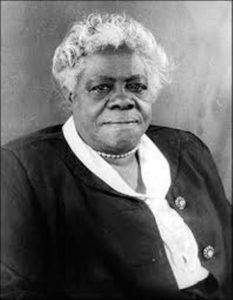
Mary M.Bethune
Mary McLeod Bethune, Black activist, administrator, and educator, was born on this date in 1875.
One of 17 children of Samuel and Patsy McLeod, former slaves, Bethune was born in Maysville, South Carolina, and worked in the cotton fields with her family. She eventually married Albertus Bethune and had a son. She attended Maysville Presbyterian Mission School, Scotia Seminary, and the Moody Bible Institute. Mary McLeod Bethune founded the Daytona Normal and Industrial Institute for Negro Girls (now Bethune-Cookman College) in 1904 and served as president twice, from 1904-1942 and 1946-47. By 1942, Bethune was forced to give up the school's presidency as it had begun to affect her health.
She worked toward President Franklin D. Roosevelt's election in 1932. She became a member of Roosevelt's "Black Cabinet," sharing the concerns of black people with the Roosevelt administration while spreading Roosevelt's message to blacks, traditionally Republican voters. She led the Black Women's Club movement and was president of the National Association of Colored Women.
Bethune was a delegate and adviser to national conferences on education, child welfare, and homeownership. She also was Director of Negro Affairs in the National Youth Administration from 1936 to 1944. She consulted the U.S. Secretary of War to select the first Black female officer candidates. After World War II, Bethune was appointed consultant on interracial affairs and understanding at the charter conference of the U.N. Founder of the National Council of Negro Women.
In 1930, journalist Ida Tarbell included Bethune as number 10 on her list of America's greatest women. In 1939, the NAACP awarded Bethune the Spingarn Medal. Bethune was the only Black woman present at the founding of the United Nations in San Francisco in 1948, representing the NAACP with W.E.B. DuBois and Walter White.
In 1949, she became the first woman to be given the Medal of Honor and Merit at the Haitian Exposition, Haiti's highest award. She was vice president of the NAACP and received the honor of Commander of the Order of the Star of Africa in Liberia. Throughout her life and beyond, she remained a constant beacon of inspiration for the entire country.
Mary McLeod Bethune died in 1955, but her legacy and life are observed in many ways. In 1973, Mary McLeod Bethune was inducted into the National Women's Hall of Fame. In 1974, a sculpture was erected in her honor in Lincoln Park, Washington, D.C. On that sculpture are engraved these words:
"I leave you love, hope, and the challenge of developing confidence in one another. I leave you a thirst for education, respect for the use of power, faith, racial dignity, and a desire to live harmoniously with your fellow men. I leave you, finally, a responsibility to our young people."
Black Heroes of The Twentieth Century
Edited by Jessie Carney Smith
Copyright 1998 Visible Ink Press, Detroit, MI
ISBN 1-57859-021-3